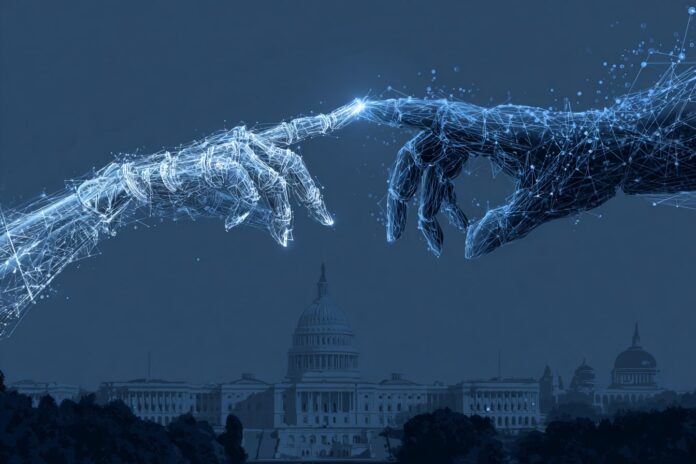The Next Political Battleground: Artificial Intelligence in D.C.
Washington, D.C. has emerged as the epicenter of an evolving technological rivalry. Most importantly, the battle is not confined to corporate competitiveness, because it now plays a pivotal role in setting federal technology policy and framing national security priorities. The stakes are higher than ever as leaders in artificial intelligence work diligently to carve out long-term influence in the public sector.
Moreover, this arms race is stimulating debate among policymakers about the role of A.I. in governance. Because of this, innovative solutions from industry pioneers like Anthropic and OpenAI are under constant scrutiny. These companies are not only focused on commercial success but are also tasked with pioneering a new infrastructure that aligns with America’s strategic goals and global security needs.
Government Adoption: $1 Deals and Massive Contracts
The federal government has embraced a transformative model by offering A.I. solutions at an almost symbolic price of $1 per year, as reported in August 2025. This pricing strategy offers a strategic foothold for both Anthropic and OpenAI in government operations. Besides that, such deals pave the way for integrating advanced technologies with public services, emphasizing how policy and technology intertwine.
Additionally, the General Services Administration (GSA) now lists Anthropic, OpenAI, and Google as approved vendors. Therefore, the contracting process has become more streamlined, allowing federal agencies to access innovative AI tools with unparalleled ease. The Pentagon’s multibillion-dollar contracts further underscore the national security imperatives guiding these decisions, as reported by sources such as Winbuzzer and FedScoop.
Innovative Offerings: Claude Gov and OpenAI for Government
To address the specific needs of the public sector, Anthropic introduced Claude Gov, a tailored suite optimized for government and national security applications. Because it directly targets federal challenges, Claude Gov is engineered to enhance efficiency and operational security across various agencies. This initiative by Anthropic is a testament to the company’s commitment to public service and innovative governance.
In parallel, OpenAI’s “OpenAI for Government” initiative represents a dynamic approach to public sector integration. Besides that, they are planning to establish a dedicated office in Washington, D.C., to foster closer relationships with governmental bodies. Consequently, these initiatives not only promise to enhance productivity across federal agencies but also set new benchmarks for technology adoption in highly regulated environments, as highlighted by Observer.
Policy Impacts: The AI Action Plan
The White House’s AI Action Plan has become the blueprint for a nationwide technological transformation. Most importantly, this plan emphasizes the rapid expansion of A.I. infrastructure, a goal that resonates deeply with both Anthropic and OpenAI. Because this initiative aims at securing American leadership in technology, it places an enormous responsibility on companies to balance innovation with ethical oversight.
Furthermore, the Action Plan underscores the importance of transparency and stringent safety protocols. Therefore, agencies are now shifting toward enhanced risk assessment measures and stricter export controls. As noted by Anthropic’s official update, maintaining streamlined energy and data center permitting processes is crucial to arresting the loss of A.I. talent to overseas competitors. This robust framework is designed to harmonize technological progress with national security imperatives.
Economic Stakes: Billions at Play
The broader economic implications of this technological arms race are profound. Most importantly, with OpenAI projecting an annual revenue of $3.4 billion in 2025 and Anthropic following with an expected $850 million, the competition is fueled by substantial financial stakes. Because these figures underline the growth potential, government contracts become strategic gateways beyond mere profit margins.
Besides that, significant venture funding and soaring valuations add further dynamism to this landscape. Therefore, it is clear that these investments go well beyond commercial gains—they represent a strategic alignment with national economic and security objectives. As detailed by AI Now Institute, success in this domain will be measured not only by revenue but by the quality and reliability of public sector integrations across the board.
The Road Ahead: Security, Regulation, and Responsibility
As the U.S. government increasingly relies on advanced A.I. solutions, the importance of robust security measures and ethical guidelines becomes paramount. Most importantly, Anthropic and OpenAI are spearheading efforts to embed comprehensive safeguards against potential threats. Because national security is at stake, these companies emphasize risk mitigation strategies that are both pragmatic and future-proof.
Moreover, regulatory frameworks are evolving to address emerging concerns related to A.I. governance. Besides that, ongoing collaborations between federal agencies and leading tech providers aim to create standards that are not only resilient but also adaptable to shifting geopolitical landscapes. These measures cultivate an environment where advanced technology harmonizes with regulatory oversight, ensuring America remains at the forefront of safe and inclusive innovation.
Final Thoughts: Why This Arms Race Matters
The ongoing A.I. arms race in Washington is multifaceted, affecting national security, economic prowess, and technological leadership. More than just a series of contracts, this competition represents the future of public sector innovation. Because both Anthropic and OpenAI are shaping policy and practice, their influence will be seen in every facet of governmental operations moving forward.
Therefore, beyond the initial headlines and dollar figures, the real impact of this arms race lies in its long-term contributions to technological governance, regulatory excellence, and societal progress. As innovations unfold and policies mature, the symbiotic relationship between government and A.I. will continue to redefine the global technology landscape. For further insights, please refer to detailed discussions available on platforms like Winbuzzer and Observer.
References
- Anthropic Matches OpenAI’s $1 Government AI Deal in Rivalry for Federal Adoption
- Anthropic: Thoughts on America’s AI Action Plan
- The New Battleground for Anthropic and OpenAI’s A.I. Race
- AI Generated Business: The Rise of AGI and the Rush to…
- Anthropic offers Claude AI to federal agencies for $1



